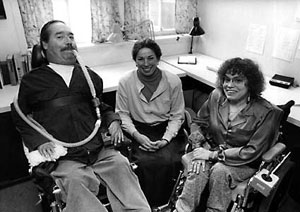|
HOME | SEARCH | ARCHIVE |
|
Bancroft archive documents
disability rights movement
Oral histories of 50
pioneers, organizational papers, tell story of a revolution
![]()
By Cathy Cockrell, Public
Affairs
| |
|
29 NOV 2000 | "Helpless cripple attends classes at UC," proclaimed a headline in a 1963 issue of Berkeley Gazette, a local community newspaper.
Time was to prove the irony of those words - which referred to Edward Roberts (who later was named director of the California Department of Rehabilitation) and to a campus and city poised to become ground zero of a nascent movement by and for the disabled.
The newspaper article is part of the newest collection at the Bancroft Library, inaugurated Nov. 3 at a campus symposium on connections between disability activism and other civil rights movements. The Disability Rights and Independent Living Movement Archive includes 50 oral histories of early local leaders of the movement, and an extensive collection of papers and photographs.
"This collection is going to enable historians and scholars to document the shift from a time when people with disabilities were seen as objects of charity needing medical supervision to people who were taking control of decisions affecting their own lives," says Susan O'Hara, former director of the campus's Disabled Students' Program.
A history teacher by training, O'Hara originally proposed such an archive in 1982, as it became "more and more obvious" to her that the disability rights/independent living cause was a bona fide social movement much like other struggles to expand civil rights protections. "But there wasn't a lot of documentation of it," she says.
An early hotbed was the campus's Cowell Hospital, where a number of early pioneers - many with severe disabilities - lived during the '60s and early '70s while attending Berkeley classes.At a time when disabled people typically lived in their parents' homes or in nursing home facilities, the opportunity to live at Cowell, (where disabled students governed many aspects of their living situation), amidst the political and social ferment of the Berkeley campus, was nothing short of revolutionary.
"People ... were having major shifts in how they looked as themselves. And shifts in the paradigm of a way of living - from a medical model, where people with disabilities were controlled by others, to an independent living, consumer-controlled model…. It just took off," says O'Hara, whose stay at Cowell during the summer of 1971 was life altering.
Berkeley disabled students began to ask "what do we need to live independently?" and to agitate to secure basic changes that would make that possible.
Collected interviews reveal successes, failures, crises and the legacy of a movement that won astonishing improvements - from blue-curb parking spaces, accessible buses and building entrances, sign-language interpreters and brailled elevator buttons to the federal Americans with Disabilities Act of 1990.
Among the oral histories collected by the Bancroft Library's Regional Oral History Project are the late Ed Roberts, featured in a volume on student pioneers in the ‘60s and '70s; Mary Lou Breslin, cofounder of the Disability Rights Education and Defense Fund, a national law and policy center founded in 1979; and Berkeley alumna Judy Heumann, now assistant director of the U.S. Department of Education.
The archive has also amassed, under the direction of collection curator Theresa Salazar, personal papers of the narrators and major Berkeley-based organizations - including the Center for Independent Living (founded by Ed Roberts and other Berkeley students and in 1972), the World Institute on Disability and the Disability Rights Education and Defense Fund.
One set of materials from the latter organization documents an exchange with the White House leading up to passage of the Americans with Disabilities Act. Other papers belonged to the late poet and journalist Mark O'Brien, who was in an iron lung during his student years at Berkeley and was the subject of the Academy Award-winning documentary, "Breathing Lessons."
In August, the Bancroft Library launched phase two of the disability archive, which will collect oral histories of movement activists in other metropolitan centers in the United States. The library will also make available, through the Web, full-text versions of the oral histories, samples of important documents in the disability rights/independent living collection, and links to sites throughout the country where related papers will be housed.
Videotapes of the recent symposium, "Intersections of Civil Rights and Social Movements: Putting Disability in its Place," will be available at Bancroft Library and the Media Center in Moffitt Library. To order a copy, call the Regional Oral History Office at 642-7395.
Home | Search | Archive | About | Contact | More News
Copyright 2000, The Regents of the University of California.
Produced and maintained by the Office of Public Affairs at UC Berkeley.
Comments? E-mail berkeleyan@pa.urel.berkeley.edu.
